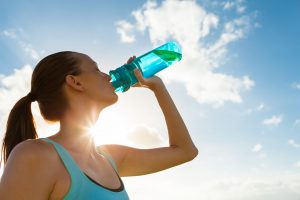Staying hydrated is often overlooked amidst the hustle and bustle of professional life. Yet, hydration is a fundamental component of overall health, affecting everything from physical performance and cognitive function to mood and energy levels. For busy professionals, maintaining optimal hydration can significantly enhance productivity, well-being, and resilience to stress. Understanding the importance of hydration and implementing practical strategies to stay hydrated throughout the day is crucial for achieving and maintaining good health.
Water is essential for life, comprising about 60% of the human body. It is involved in virtually every bodily function, including temperature regulation, digestion, nutrient absorption, and waste elimination. Adequate hydration supports cardiovascular health, joint lubrication, and skin elasticity. It also plays a critical role in cognitive function, influencing concentration, memory, and mental clarity. Even mild dehydration can impair physical and mental performance, leading to fatigue, headaches, and reduced productivity. Therefore, staying adequately hydrated is vital for busy professionals who need to perform at their best.
The first step to staying hydrated is recognizing the signs of dehydration. Thirst is a clear indicator, but it often signals that the body is already dehydrated. Other signs include dry mouth, dark-colored urine, fatigue, dizziness, and irritability. It is essential to drink water regularly throughout the day, rather than waiting until you feel thirsty. A general guideline is to drink at least eight 8-ounce glasses of water daily, but individual needs may vary based on factors such as age, weight, activity level, and climate. For busy professionals, setting hydration goals and establishing routines can help ensure adequate water intake.
One effective strategy for staying hydrated is to start the day with a glass of water. After several hours of sleep, the body is naturally dehydrated, and drinking water upon waking can help replenish fluids and kick-start the metabolism. Keeping a water bottle on your bedside table can serve as a reminder to hydrate first thing in the morning. Throughout the day, carrying a reusable water bottle can make it easier to sip water regularly. Choosing a bottle that you enjoy using, whether it’s stainless steel, glass, or BPA-free plastic, can encourage consistent hydration.
Incorporating water breaks into your daily routine is another practical approach. Taking short breaks to drink water can provide a moment of relaxation and mental reset, which is particularly beneficial during a busy workday. For instance, drinking a glass of water before each meal can aid digestion and help control appetite. Setting reminders on your phone or computer can prompt you to take regular hydration breaks. Additionally, associating drinking water with specific activities, such as checking emails or attending meetings, can help establish a consistent hydration habit.
While water is the best source of hydration, other beverages can also contribute to your daily fluid intake. Herbal teas, infused water, and coconut water are excellent alternatives that provide hydration without added sugars or artificial ingredients. Herbal teas such as chamomile, peppermint, and rooibos can be soothing and offer various health benefits. Infused water, made by adding slices of fruits, vegetables, or herbs to water, can enhance flavor and encourage more frequent drinking. Coconut water is a natural source of electrolytes and can be particularly refreshing after exercise. However, it is important to limit the intake of caffeinated and sugary beverages, as they can have diuretic effects and contribute to dehydration.
Eating water-rich foods is another effective way to stay hydrated. Many fruits and vegetables have high water content and can contribute to your overall fluid intake. Examples include cucumbers, lettuce, watermelon, strawberries, oranges, and celery. Including these foods in your meals and snacks can help boost hydration levels. For busy professionals, keeping a stash of cut-up fruits and vegetables in the fridge can provide convenient, hydrating snacks. Additionally, consuming soups, stews, and broths can add to your daily fluid intake while providing essential nutrients.
Electrolytes, such as sodium, potassium, calcium, and magnesium, play a crucial role in maintaining fluid balance and hydration. These minerals help regulate muscle function, nerve impulses, and hydration status. During intense physical activity or in hot weather, the body loses electrolytes through sweat, and it is important to replenish them. Drinking electrolyte-rich beverages, such as sports drinks or electrolyte-enhanced water, can help maintain hydration and electrolyte balance. However, it is important to choose options with low sugar content. Alternatively, natural sources of electrolytes, such as bananas, avocados, and leafy greens, can be included in your diet to support hydration.
Balancing hydration with caffeine consumption is important for busy professionals who rely on coffee or tea to stay alert. While moderate caffeine intake can enhance focus and productivity, excessive consumption can lead to dehydration due to its diuretic effects. It is advisable to limit caffeine intake to no more than 400 milligrams per day, equivalent to about four 8-ounce cups of coffee. Additionally, drinking a glass of water alongside your caffeinated beverage can help counteract its dehydrating effects. Opting for herbal teas or decaffeinated coffee can also reduce caffeine intake while still providing a comforting beverage.
Staying hydrated is particularly important during physical activity, as exercise increases fluid loss through sweat. For busy professionals who incorporate fitness into their routine, it is crucial to drink water before, during, and after exercise. Pre-hydrating by drinking water an hour before exercise can ensure you start your workout well-hydrated. During exercise, sipping water at regular intervals can help maintain hydration levels, especially for activities lasting longer than 30 minutes. Post-exercise hydration is essential for recovery, and replenishing fluids within two hours of working out can help restore fluid balance. Electrolyte-enhanced beverages can be beneficial for intense or prolonged exercise sessions.
Travel and busy schedules can pose additional challenges to staying hydrated. Air travel, in particular, can lead to dehydration due to low humidity levels in the cabin. Drinking water before, during, and after flights is crucial for preventing dehydration. Carrying a refillable water bottle and filling it after passing through security can help ensure you have access to water throughout the flight. For professionals with busy schedules, planning ahead and keeping a water bottle in your bag, car, or office can facilitate regular hydration. Portable water filters or purification tablets can also be useful for ensuring access to clean water when traveling to areas with uncertain water quality.
Incorporating hydration into self-care routines can enhance overall well-being and support mental health. Staying hydrated can improve mood, reduce stress, and enhance cognitive function. Dehydration has been linked to increased feelings of anxiety and irritability, making it essential to prioritize hydration for emotional well-being. Engaging in self-care practices, such as taking a relaxing bath, meditating, or practicing mindfulness, can be complemented by drinking water or herbal tea. By integrating hydration into your self-care routine, you can support both physical and mental health.
Education and awareness are key to maintaining proper hydration. Understanding the importance of hydration and recognizing the signs of dehydration can empower individuals to make informed choices about their fluid intake. Educating employees about hydration through workplace wellness programs can promote a healthy and productive work environment. Providing access to water coolers, encouraging regular hydration breaks, and offering water-rich snacks can create a culture of hydration in the workplace. By fostering awareness and promoting healthy hydration habits, organizations can support the well-being of their employees.
Staying hydrated is essential for overall health and well-being, particularly for busy professionals who need to maintain peak performance. Hydration supports physical and cognitive function, enhances mood, and reduces stress. Recognizing the signs of dehydration and implementing practical strategies, such as starting the day with a glass of water, carrying a reusable water bottle, incorporating water breaks into the daily routine, and consuming water-rich foods, can help ensure adequate hydration. Balancing caffeine consumption, replenishing electrolytes, and prioritizing hydration during physical activity and travel are also important. Integrating hydration into self-care routines and promoting education and awareness can further support mental and physical health. By making hydration a priority, busy professionals can enhance their productivity, well-being, and resilience to the demands of modern life.





